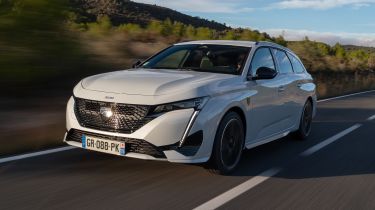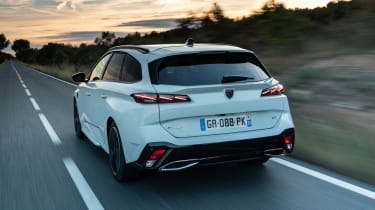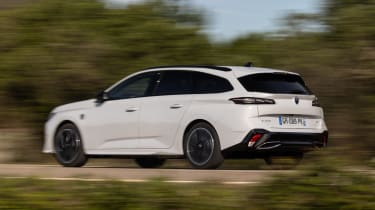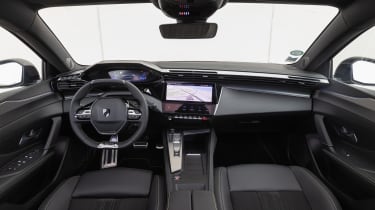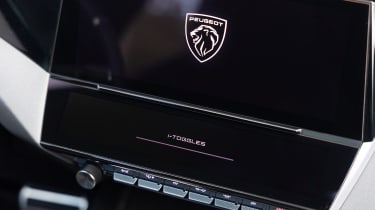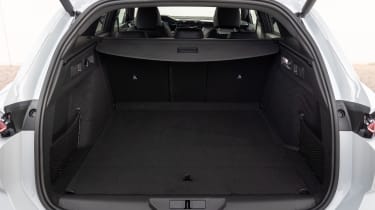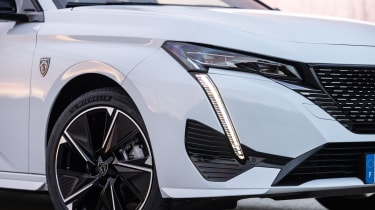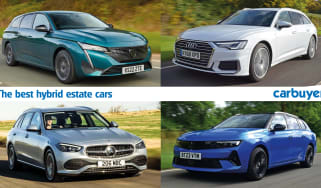Peugeot E-308 SW review - upmarket electric estate
“The Peugeot E-308 SW brings a touch of class and refinement to the niche electric estate car market”
Pros
- High-quality interior
- Entry-level Allure is well equipped
- Nimble handling
Cons
- Slow infotainment system
- Limited rear headroom
- Delated power delivery
Verdict - Is the Peugeot E-308 SW a good car?
The Peugeot E-308 SW is a welcome addition to the electric estate car market, bringing a premium polish to a niche with few models to pick from. It’s not without its faults, however, with less impressive performance than you might expect from an electric car and a slow infotainment system, but all in all the E-308 SW exudes quality and refinement.
Peugeot E-308 SW models, specs and prices
The electric estate car market is a very small one, and just a few years ago MG proudly claimed the MG5 was the first EV wagon for sale in the UK – now though, there are a few models to choose from including this: the Peugeot E-308 SW. It’s based on the same underpinnings as the Vauxhall Astra Sports Tourer Electric, but parent company Stellantis now positions Peugeot as a slightly more upmarket brand than before, which is quite evident in the latest E-308 SW. It stands out alongside the Vauxhall Astra Sports Tourer Electric and MG5 with a little more flair and polish, along with edgier styling.
If you’re not entirely bothered about going for an electric estate but just want the practicality, then the petrol, diesel or plug-in hybrid 308 SW will be quite a bit cheaper to buy than the E-308. There are also more rivals in this segment if you don’t need a pure EV, including the Ford Focus Estate, Vauxhall Astra Sports Tourer, Volkswagen Golf Estate, SEAT Leon Estate and the impressively practical Skoda Octavia Estate.
There are even sporty estates such as the Ford Focus ST Estate and Cupra Leon Estate, if you’re after a capable everyday car that will also raise the hairs on the back of your neck.
More reviews
In-depth reviews
Though some electric cars are known for their face-bendingly punchy performance, that’s not the case here. The Peugeot E-308 SW gets a maximum power figure of 154bhp from its electric motor, but only if you put it into Sport mode – otherwise it’s limited to 134bhp in Normal mode. In any case, the E-308 SW feels like it’s been designed to mirror the power delivery of a conventional car, so it should appeal to buyers who want a familiar driving feel.
|
Trim levels |
Power options |
|
|
How we tested the Peugeot E-308 SW
We tested the E-308 SW at its launch event on Spanish roads. It took place in cool weather in November 2023, across a mixture of urban, rural and motorway driving routes. Our expert road testers have driven every other electric estate car that's on sale in the UK and the opinions in this review are based on how well these cars perform in comparison to the Peugeot E-308 SW. Read more about why you can trust Carbuyer reviews...
Range, charging & running costs
The Peugeot E-308 SW has arrived alongside an update to the electric motor and batteries fitted in the rest of the Peugeot E-308 range. That means it gets the brand’s latest 54kWh battery which comes with a heat pump to help optimise range and efficiency. Because batteries can perform worse in colder weather, and it takes energy to heat the cabin – this may prove a useful addition in the winter months.
As it’s still early days, Peugeot is yet to release WLTP range figures for the E-308 SW, but it’s expected it could deliver up to 248 miles to a charge, putting it roughly on par with the MG5 and Vauxhall Astra Sports Tourer Electric. When it does need a top-up, the E-308 SW’s 100kW DC charging means taking it from 20 to 80% at a public charging point could take around 25 minutes, and it also gets 11kW three-phase charging capability, which could prove useful if you have a compatible home wallbox charger. These charging speeds are fairly respectable, but not groundbreaking.
|
Model |
Battery size |
Range |
|
Peugeot E-308 SW |
54kWh |
248 miles (estimated) |
|
Vauxhall Astra Sports Tourer |
54kWh |
256 miles |
|
MG5 |
61kWh |
250 miles |
What will it cost to insure?
Insurance groups are yet to be confirmed for the Peugeot E-308 SW, but we’d expect it to be quite expensive to insure. Electric vehicles are usually more expensive to cover than their petrol-powered counterparts, and the most expensive-to-insure petrol model in the standard 308 range currently sits in group 29.
As a general rule, the lineup is more expensive than the Vauxhall Astra Sports Tourer to insure, likely down to its more premium image, so we’d expect this to be reflected for the electric E-308 SW and Astra Sports Tourer Electric. The MG5 currently sits in group 32, but we’d expect this to be the cheapest of the three to insure, based on its lower price to purchase.
Electric motor, drive & performance
The standard Peugeot E-308 recently received an updated electric motor, and this change has carried over to the newly-launched E-308 SW – that means it gets up to 154bhp (depending on the drive mode) sent to the front wheels.
We’re happy to report that despite the E-308 SW’s larger size and heavier weight compared to the standard model, the driving experience is just as good as ever. The steering is fairly heavy, but in a way that feels reassuring, and it’s responsive to your inputs – Peugeot’s compact steering wheel has become a bit of a brand staple, and we think it works well in the E-308 and E-308 SW.
Ride quality is good, although there’s the occasional jolt from more major imperfections in the road, though this is rare. Overall the E-308 SW strikes an acceptable balance of driving dynamics and comfort. It’s a better all-rounder in this respect than the MG5, which can feel a little numb and spongey from behind the wheel.
The E-308 gets a range of driving modes, and it’s worth noting that you won’t get the full 154bhp the motor has to offer unless you’re in ‘Sport’ mode, as ‘Normal’ limits this to 134bhp to conserve battery power.
Is it good to drive in town?
The E-308 SW is of course larger than the standard E-308 given its larger boot, so naturally you’ll have to take more care when manoeuvring in tighter spots. That said, given its hatchback underpinnings, the E-308 SW feels like a much smaller car to drive than you might expect. The E-308’s electric motor feels like it’s been configured to deliver power in a similar way to a combustion-engined 308, with a slight delay after you put your foot down, so it should feel familiar to drive around town if you’re coming from a more conventional petrol model.
Is it good to drive on long journeys?
For particularly long journeys you might need to plan your route more carefully ahead of time compared with a petrol-powered 308 to make sure you hit an EV charging station en route and factor in the time to recharge. That aside, the E-308 SW’s ride quality should be comfortable enough on motorways to be relaxing for the driver and passengers, though rear passenger headroom is limited, so full-grown adults might find it uncomfortable after a while.
Is it good to drive on B-roads?
When we drove the E-308 SW on Spanish roads we found it responsive and easy to drive through the corners. It feels grippy and body roll is kept to a satisfactory level, but some might argue it’s almost more nimble than an estate car needs to be. That needn’t be a complaint really, as thankfully the ride hasn’t suffered as a result.
|
Model |
Power |
0-62mph |
Top speed |
|
Peugeot E-308 SW |
154bhp |
9.9 seconds |
106mph |
Carbuyer notes
“It’s a more complete package dynamically than the MG5” John McIlroy, Deputy Editor
Interior & comfort
Peugeot has been repositioning itself as a more upmarket brand in recent years, and this is evident on the E-308 SW’s interior. The cabin is mostly adorned with high-quality materials, while other lower-quality elements are hidden out of sight. The small steering wheel that’s part of Peugeot’s trademark i-Cockpit layout helps the car interior stand out amongst rivals, and it’s something buyers will either love or hate.
Peugeot has taken a step in the right direction to make the E-308 SW’s controls more user-friendly than some of its recent models. There's a panel of physical shortcut buttons and a touch-sensitive panel which can be configured with further widgets and shortcuts, allowing you to get straight to certain functions like the heating or ventilation. Once you click the physical button to tweak the climate controls, though, it takes you to a screen on the infotainment which can be fiddly and frustrating to use. It’s a shame Peugeot didn’t install fully physical dials to tweak these settings.
Is the infotainment and navigation system easy to use?
The E-308 SW’s system can be slightly slow to use at times. There are transitional animations between screens that we suspect have been implemented to disguise loading times, but these negatively affect its usability. Otherwise, though, the infotainment system looks modern and crisp.
Which trim level and options should you choose?
Unlike the petrol-powered 308 which starts with entry-level Active trim, the electric Peugeot E-308 SW starts from mid-spec Allure. That means all E-308 SWs get 18-inch alloys, heated front seats and steering wheel, and Peugeot’s double-screen infotainment display and digital instrument cluster. We think it’s well-equipped enough for most buyers, so the extras you get by stepping up to GT trim might not feel worth it – these include upgraded matrix-LED headlights, some additions to exterior styling, Alcantara sports seats and a 3D display on the digital gauge cluster which, if we’re honest, feels like an unnecessary gimmick we could happily do without.
|
Allure
|
GT (Allure plus…)
|
Practicality & boot space
The Peugeot E-308 SW is designed to be a more practical version of the standard E-308 hatchback, and while the obvious improvement is a larger boot, space for rear passengers could be better. There’s a generous amount of knee and leg room, but taller occupants might find headroom lacking, given the car’s tapering roofline. The rear seats are better suited to children or teenagers than fully grown adults on longer journeys.
|
Size comparison | |||
|
Model |
Length |
Width |
Height |
|
Peugeot E-308 SW |
4,636mm |
1,852mm |
1,442mm |
|
Vauxhall Astra Sports Tourer Electric |
4,642mm |
1,860mm |
1,480mm |
|
MG5 |
4,600mm |
1,808mm |
1,543mm |
How big is the boot?
Of course, the main selling point of the E-308 SW compared to the standard hatchback model is its larger boot. With 548 litres with the rear seats up, and 1,574 litres with them folded down, the E-308 SW’s boot is just as big as that of the hybrid 308 SW. That beats the MG5’s 464-litre capacity (1,456 litres with seats down) and the Astra Sports Tourer Electric’s 516 litres (1,553 litres with seats down).
The E-308 SW’s boot has a low lip making it easy to get heavy items in and out, and there’s enough space under the floor to store the charging cable, keeping the loadspace clear and uncluttered.
|
Boot space comparison | |
|
Model |
Boot space |
|
Peugeot E-308 SW |
548 litres |
|
Vauxhall Astra Sports Tourer Electric |
516 litres |
|
MG5 |
464 litres |
Reliability & safety
Neither the Peugeot 308, E-308, nor the SW estate model appeared in the 2023 Driver Power customer satisfaction survey, so reliability and owner satisfaction remains a grey area for now. Another related model, the Citroen C4 (including the electric e-C4) with which the 308 and E-308 share many of their parts came in a remarkable first place, so hopefully some of this success will be reflected in the Peugeot.
While not specific to the E-308 or Peugeot’s electric models, a lower-than-average 19% of the brand’s owners reported an issue with their Peugeot in the first year of ownership. Overall, Peugeot came in ninth place out of 32 manufacturers, higher than sister brands Citroen (11th place) and Vauxhall (24th place) in terms of overall customer experience.
How safe is it?
The Peugeot E-308 has yet to be tested by Euro NCAP, but its petrol and diesel equivalent, the 308 scored four out of five stars in 2022 – this only serves as a rough guide, though, as the organisation notes this rating cannot be applied to the E-308. Further to this, the SW estate version is a niche car that is unlikely to be tested specifically by Euro NCAP.
While safety assist tech is plentiful on the E-308 SW, Euro NCAP rated the autonomous emergency braking (AEB) system on the 308 (which is most likely the same system used in the E-308) as sub-par.
Other systems include lane keep assist, driver attention alert and a low-speed exterior sound generator to alert pedestrians to your presence. Stepping up to GT brings extra safety kit including a rear cross-traffic alert system, adaptive cruise control and lane positioning assist.
What are the service intervals?
Peugeot recommends you service your E-308 SW every year or 20,000 miles, and the brand will supply you with a certificate of battery capacity after each service.
What is the warranty?
Peugeot’s standard warranty covers the car for three years from the date of registration, with unlimited mileage in the first two years, decreasing to 60,000 miles for the third year. This is in line with the majority of manufacturers, but not quite as good as the seven-year warranty offered by MG. The E-308 SW’s 54kWh battery comes with a warranty that guarantees it’s still capable of up to 70% of its original capacity within an eight-year or 100,000-mile period.
Is the Peugeot E-308 SW a good car and should you buy one?
At the moment, the market for estate electric cars is very niche, with very few direct rivals for the E-308 SW to compete against. It’s the first of its kind to offer a slightly more premium alternative, so it’s worth considering if you want something that will stand out against the Vauxhall Astra Sports Tourer Electric or the MG5 before more rivals start to fill the segment.
However, if you’re looking for an estate of this size and you’re not particularly bothered whether it’s electric, then the standard 308 SW is over £10,000 cheaper, and its 1.2-litre petrol engine is very economical. Really, though, once you start considering more mainstream petrol estate models, there’s no avoiding the fact that the Skoda Octavia Estate trumps the 308 SW for boot space and is an overall more well-rounded package.
What is the Carbuyer pick of the range?
Considering that it’s already a pricey car, we’d stick with the Allure model. This has most of the kit families will want, so splashing out on the GT just makes the E-308 SW a bit more luxurious and sporty looking.
Peugeot E-308 SW alternatives
The Peugeot E-308 SW is one of very few electric estate cars, but it's competing in a few areas as a result. Those in the market for something practical and electric might be considering a mid-size electric SUV, too, or if you're not too bothered whether it's electric or not there are also plenty of small family estate cars to choose from.
Electric estates
Until very recently the electric estate niche was a class of one, but the MG5 now faces stiff competition from the Peugeot and Vauxhall Astra Sports Tourer Electric.
- MG5
- Vauxhall Astra Sports Tourer Electric
Mid-size electric SUVs
If you’d like more choice and a trendy SUV bodystyle, there are numerous options in the electric SUV class. Models like the Tesla Model Y and Skoda Enyaq are great family options.
- Tesla Model Y
- Skoda Enyaq
- MG ZS EV
- Hyundai Kona Electric
Small family estates
If you don’t have to have a fully electric car, there are lots of great small estate cars with a mixture of petrol, diesel and hybrid options.
- Skoda Octavia Estate
- Ford Focus Estate
- SEAT Leon Estate
Which Is Best?
Cheapest
- Name115kW Allure 54kWh 5dr Auto
- Gearbox typeAuto
- RRP£36,150
Most Economical
- Name115kW Allure 54kWh 5dr Auto
- Gearbox typeAuto
- RRP£36,150
Fastest
- Name115kW Allure 54kWh 5dr Auto
- Gearbox typeAuto
- RRP£36,150
